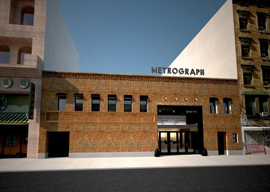
May 14, 2016

New York—It was the best of times—downtown—and the worst of times—uptown. Let’s start with the horror near the park: Cranial atrophy, unrelenting grossness, overarched and overgrown eyebrows, posterior-baring bondage outfits, and de haut en bas attitudes were the order of the night. Never has a museum site been more desecrated by a freak show, and the Met—maybe the best museum in the whole wide world—should be ashamed of itself. A great institution such as the Met always needs funds, but allowing a freak show of publicity-starved clowns is not the answer. Let’s take it from the top.
The Met Gala used to be a chic affair, where social-climbing millionaires could buy a table for the evening and invite their betters. Mrs. William Buckley was chairman and ran it as she ran her own house: with elegance and discretion. Twenty or so years ago, Anna Wintour took over, and it’s been downhill ever since. This year it reached its nadir. Apple was the sponsor, and the slobs who paid 30,000 big ones just to get in matched those exhibitionists and bum bandits who paid 300,000 smackers for a table for eight. Glum sourpusses ruled the day. The unsmiling (except for the camera) crowd’s attitude is one and the same the world over: Do you know who I am, how dare you? And they are an ugly bunch, these megacelebrity types that la Wintour invites: Lady Gaga, Madonna, Maria Sharapova, the ubiquitous Kardashians, the horror of Kanye West in ripped jeans for a black-tie affair, I could go on.
I used to attend the fashion gala rather regularly back in the good old days. The place was full of friends, with lotsa models and the odd actress thrown into the mix. It was a fun party until NYC society collided with new money. Now even the new money hides when faced with celebrity trash. Mr. Jay Z’s wife arrived last, and ink-stained wretches popped inquiries on such original topics as the state of her marriage. The most preposterous poseur among a thousand such species was one Hamish Bowles, a Brit, a popinjay of rare ridiculousness, a man who would besmirch a group of arrested-development 12-year-olds with his lightness of being. But enough said about the freak show and the dysfunctionality of fashion.
Five miles south of the Met, on Ludlow Street, the wonderful Metrograph cinema held a different evening, one honoring the great director James Toback’s long-lost documentary The Big Bang. Toback has always been obsessed with “the orgasmic explosion of God,” how one connects the human and the cosmos. He shot it back in 1989, and recently discovered it somewhere in his archives. Wittgenstein’s idea that words mislead as well as inform is his guide. According to Toback the universe is both chaotic and ordered, like us.
Actually, it’s a film about humanity: a philosopher nun, a murderer, a mother who lost a child, a top violinist who died of an overdose, a great basketball star, a playwright, a tavern keeper. All spoke without guile, because Toback is an expert interviewer, kind but to the point. He lets the camera run, and gets great results. There are some poignant subjects, such as the beautiful Missy Boyd, a mother who lost her daughter in a car accident; a Hollywood top banana raised a Catholic, and the pain his parents inflicted on him to be a good Christian; the playwright who pretends to be in control but is very lost. The film touches on the human agony that everyone feels at some point in life.
I liked the mobster, one of the best-looking men I’ve ever seen—smart, tough, unyielding, until he talks about his father’s five-year struggle with cancer, his father’s courage and lack of self-pity bringing tears to the hitman’s eyes. Afterwards, that great wordsmith James Walcott interviewed Jimmy Toback on the stage. Listening to two intelligent men discussing film and life in general was a treat. (Especially when yours truly’s name came up, and the 38-year run in The Spectator of this column.) Then I had to go out and get drunk. I roamed the Village alone, went into a bar and had a couple of stiff doubles. I thought about the evening. The only certainty in my mind is that the gala was the one time any of the attending uptown will visit a museum. The unrelenting grossness of the celebrity-fashion tribe is depressing as hell, but such are the joys of modern life. The event downtown made life worth living. It showed how wrong the Western ethos that everyone should be a winner every day is. Uptown the lust for publicity and fame has robbed most of those attending of their humanity. Downtown there were no egos tapping as if on parade. This was real life, with all its triumphs and disasters, all the joys and heartbreaks. So I got nice and drunk and felt awful the next day, but such is life.